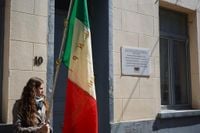An international conference titled 'Beliefs, Rituals and Popular Festivals Between Tradition and Renewal' is set to take place at Tallinn University on May 13 and 14, 2025. This two-day event aims to delve into the significance of collective rites and their role in shaping identity across various disciplines, including anthropology, literature, history, cinema, and the visual arts. The conference is organized by the Italian Embassy in Tallinn, which has announced that numerous insights will focus on Italian folklore traditions.
One of the highlights of the conference will be a show-conference entitled 'Bella Ciao: Genesis and Transformation of a Myth', scheduled for May 13 at 4:30 p.m. in Tallinn University's Blackbox V-103. This event will explore the rich history and diverse meanings of one of Italy's most renowned songs, "Bella Ciao," which has transcended its origins to become a global symbol of resistance and freedom.
Meanwhile, on May 8, 2025, a memorial plaque was unveiled at 10 Rue de la Perle, Molenbeek, Brussels, commemorating the 80th anniversary of the end of World War II. This significant event was marked by the presence of various dignitaries and citizens, paying tribute to four residents of the building, including three Italian partisans—Etrusco Benci, Elvio Coccia, and Carlo Cocciarelli—who were victims of Nazi repression during the war. The plaque serves as a poignant reminder of their bravery and sacrifice.
The initiative was sponsored by the Belgian section of the ANPI (National Association of Italian Partisans) and reflects a commitment to honor those who fought against fascism. According to Roberto Galtieri from ANPI Belgium, “The decision to install it precisely on May 8 is not accidental. It is an occasion to remember that among the liberators of our democracy were also Italian migrants, young Jews, women and men united by the courageous choice of the Resistance.”
The Italian Ambassador to NATO, Marco Peronaci, also spoke at the ceremony, emphasizing the universal value of the sacrifices made by those who fought for freedom. “Freedom is one of the foundations of our European civilization. But it cannot exist without historical awareness. Today, more than ever, memory is a tool to resist hatred and violence. Europe was also born thanks to these acts of courage, these names carved into the silence of the walls. We owe our present to those who have fought, often without recognition, for a more just future,” he stated.
Francesco Variale, the Consul of Italy in Brussels, underscored the educational significance of such commemorations. He remarked, “Initiatives like this serve to make known, especially to younger people, a fundamental part of Italian and European history. We cannot let ignorance or revisionism erase the courage of these men and women. Remembering the Italian partisans who gave their lives for democracy is not only a civic duty, but also an investment in the future of the European Union. The roots of our peaceful coexistence lie in the struggle against Nazi-fascism.”
The ceremony took place in the presence of members from the Molenbeek municipality, civil society representatives, and numerous citizens. Mayor Amet Gjanaj highlighted the relevance of anti-fascism in today’s society, stating, “Unfortunately, it is not just history. In recent weeks, our neighborhood has been the scene of a racist attack by right-wing extremists. That is why today, more than ever, it is crucial to reaffirm our commitment: Molenbeek is an open city, with over 120 cultural origins represented, and will continue to be so.”
Local authorities have announced plans to strengthen pathways of remembrance in schools, aiming to promote workshops and meetings with witnesses and historians. They emphasized that remembrance is “not a celebration of the past, but a gesture of active resistance against the new forms of hatred that are resurfacing in Europe.”
The ceremony concluded on an emotional note with the collective singing of "Bella Ciao," symbolizing both reflection and hope. This song, which has become synonymous with the struggle against oppression, resonated deeply with attendees, reinforcing the message of unity and resistance against tyranny.
As the events unfold in Tallinn and Brussels, it is evident that the themes of memory, resistance, and cultural identity are more relevant than ever. The upcoming conference in Estonia promises to shed light on traditional practices while the memorial in Belgium serves as a reminder of the sacrifices made in the name of freedom. Together, these events highlight the importance of honoring the past to build a more inclusive and understanding future.

